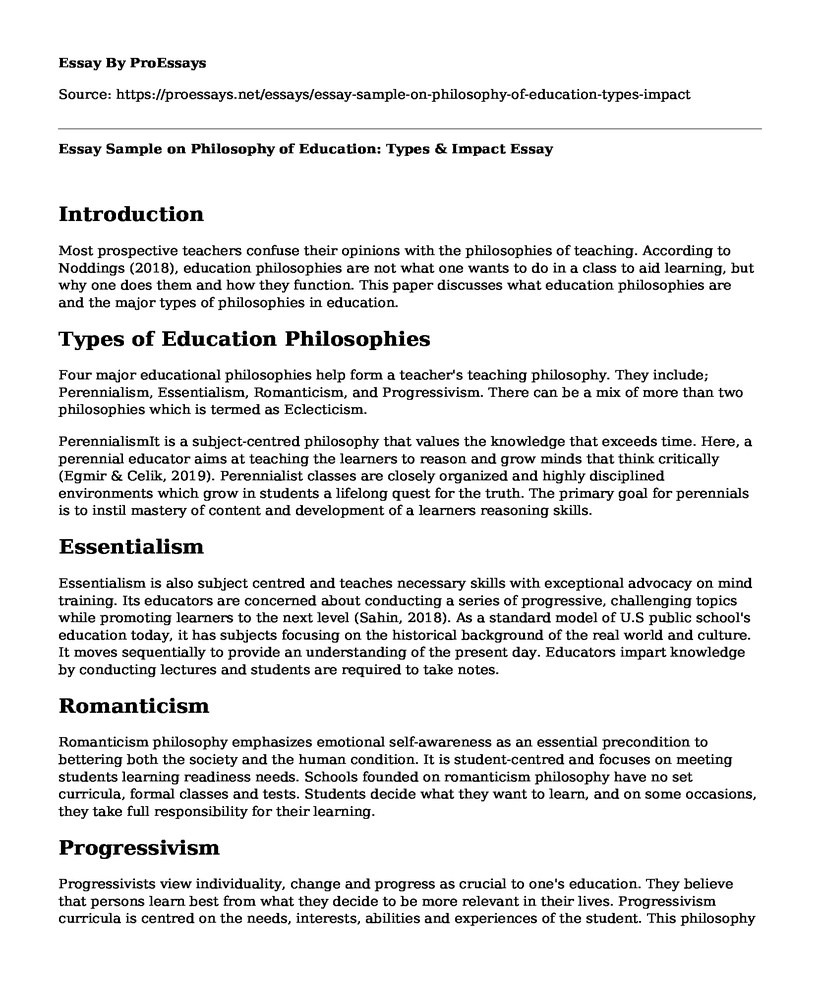Introduction
Most prospective teachers confuse their opinions with the philosophies of teaching. According to Noddings (2018), education philosophies are not what one wants to do in a class to aid learning, but why one does them and how they function. This paper discusses what education philosophies are and the major types of philosophies in education.
Types of Education Philosophies
Four major educational philosophies help form a teacher's teaching philosophy. They include; Perennialism, Essentialism, Romanticism, and Progressivism. There can be a mix of more than two philosophies which is termed as Eclecticism.
PerennialismIt is a subject-centred philosophy that values the knowledge that exceeds time. Here, a perennial educator aims at teaching the learners to reason and grow minds that think critically (Egmir & Celik, 2019). Perennialist classes are closely organized and highly disciplined environments which grow in students a lifelong quest for the truth. The primary goal for perennials is to instil mastery of content and development of a learners reasoning skills.
Essentialism
Essentialism is also subject centred and teaches necessary skills with exceptional advocacy on mind training. Its educators are concerned about conducting a series of progressive, challenging topics while promoting learners to the next level (Sahin, 2018). As a standard model of U.S public school's education today, it has subjects focusing on the historical background of the real world and culture. It moves sequentially to provide an understanding of the present day. Educators impart knowledge by conducting lectures and students are required to take notes.
Romanticism
Romanticism philosophy emphasizes emotional self-awareness as an essential precondition to bettering both the society and the human condition. It is student-centred and focuses on meeting students learning readiness needs. Schools founded on romanticism philosophy have no set curricula, formal classes and tests. Students decide what they want to learn, and on some occasions, they take full responsibility for their learning.
Progressivism
Progressivists view individuality, change and progress as crucial to one's education. They believe that persons learn best from what they decide to be more relevant in their lives. Progressivism curricula is centred on the needs, interests, abilities and experiences of the student. This philosophy emphasizes on group activities where students learn through cooperative learning techniques. Since it is experimental and visionary, progressivism focuses on developing a student's problem-solving ability. Students test ideas by active experimentation and learning is anchored on the questions the students raise through experiencing the world.
References
Egmir, E., & Celik, S. (2019). The Educational Beliefs of Pre-Service Teachers as an Important Predictor of Teacher Identity. International Journal of Contemporary Educational Research, 6(2), 438-451. https://doi.org/10.33200/ijcer.621717
Noddings, N. (2018). Philosophy of education (4th ed.). Routledge.
Sahin, M. (2018). Essentialism in Philosophy, Psychology, Education, Social and Scientific Scopes. Online Submission, 22(2), 193-204.
Cite this page
Essay Sample on Philosophy of Education: Types & Impact. (2023, Apr 08). Retrieved from https://proessays.net/essays/essay-sample-on-philosophy-of-education-types-impact
If you are the original author of this essay and no longer wish to have it published on the ProEssays website, please click below to request its removal:
- Be Aware About Anti-Bias for Preschool
- Susan's Issues in Class Case Study
- Application for Campus Transfer
- Does Rap Music Promote Violence in High School? Essay
- Essay Example on the Path to My Academic Growth: Engineering & Management
- Essay Example on Lesson Plan Presentation: Preparing for Success
- Paper Example on High Impact Practices: Undergraduate Research Experience & Benefits







